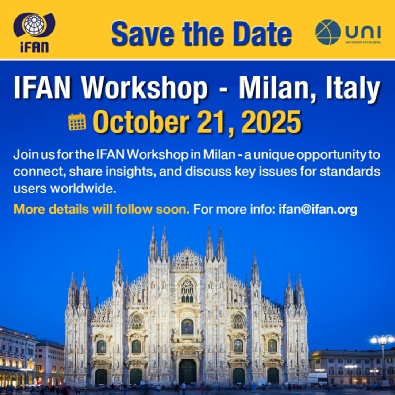On 21 October 2025, representatives from the EDU4Standards.eu project contributed to the IFAN workshop “Standards Education: A Strategic Priority”, held in hybrid format at UNI – Ente Italiano di Normazione, in Milan, Italy, as part of the 52nd IFAN Members Assembly.
Hosted by UNI and moderated by IFAN President Vered Oren, the workshop brought together international experts from standardisation bodies, academia and industry to explore why and how standards education should be strengthened globally.
The programme featured contributions from speakers including Nizar Abdelkafi and Geerten van de Kaa, both partners in the EDU4Standards.eu consortium.
Why higher education should teach standardisation
In his presentation, “Why Should Higher Education Institutions Teach Standardization?”, Nizar Abdelkafi underlined how standards form the often-invisible backbone of modern societies and economies, from time zones and railway tracks to smartphone chargers and digital infrastructures. He argued that organisations unable to understand, use and shape standards risk losing competitiveness in increasingly dynamic and technology-driven markets.
Challenging the recurring perception that standardisation is rigid, overly technical or “boring”, he illustrated how engagement with standards can in fact stimulate innovation, strengthen strategic decision-making, and provide clear real-world relevance for students. Integrating standardisation into university curricula, he noted, helps develop strategic thinking, improves graduate employability, and supports national and industrial competitiveness.
Nizar called on higher education institutions to embed standardisation either through dedicated courses or by integrating it into existing programmes across disciplines. He emphasised the importance of learning approaches that foster collaboration, creativity and active participation, enabling students not only to understand existing standards but also to contribute to the standards of tomorrow.
Bridging Europe’s hidden skills gap in standardisation
In his talk, “Bridging the Hidden Skills Gap: Powering Europe’s Industrial Transformation”, Geerten van de Kaa highlighted a growing and often overlooked challenge: the skills and awareness gap in standardisation across Europe. He noted that standardisation remains largely invisible in most educational pathways, leading to limited knowledge, few structured courses, and a shortage of suitable teaching materials across universities.
Geerten presented EDU4Standards.eu as a direct response to this situation. He outlined the project’s teaching concept, structured around four key knowledge areas:
- Basic awareness of standardisation
- Understanding interdependencies between standards, technologies and markets
- Strategic use of standards by organisations
- Strategic participation in standardisation processes
He explained how the project has translated this framework into intended learning outcomes and concrete educational pilots. Eight pilots were showcased, spanning bachelor and master programmes, extracurricular activities and professional training. These initiatives involve many EDU4Standards.eu partners, such as the University of Belgrade, TU Delft, TU Berlin, and Politecnico di Milano, alongside a summer school, SME-focused training formats and a pan-European online module designed to reach diverse learner profiles.
Geerten concluded that reinforcing standards education is essential for Europe’s industrial and technological ambitions, ensuring that learners, educators, and industry professionals have the capabilities needed to both shape and benefit from standardisation in a rapidly evolving innovation landscape.
The workshop’s focus on standards education as a strategic priority aligns closely with the objectives of EDU4Standards.eu: to make standardisation visible, accessible and actionable in higher education and lifelong learning, and to support Europe’s capacity to lead and collaborate in global standard-setting processes.
